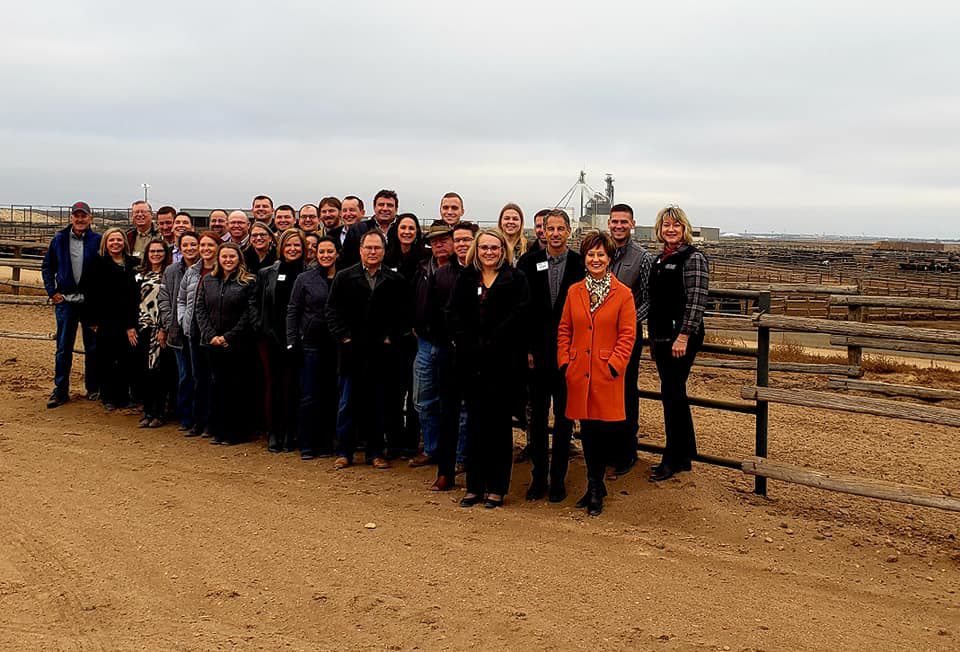Alumni of the Kansas Agriculture and Rural Leadership Program consistently say that of all the seminars across the state through the two-year series, the southwest Kansas stop in Garden City tops the list for eye-opening moments. Current Class XV participants had the opportunity to experience it for themselves Nov. 6 to 8.
What makes the seminar so memorable is how it tends to change the perception of class members who hail from all four corners of the state. Perceptions of what they think southwest Kansas is and how large-scale agricultural enterprises operate in smaller communities.
The first day led off with a panel discussion about how Garden City was founded on diversity and agriculture and those are still pillars of the local economic development, from the feedlots to the local service industry. Moderator Lona DuVall, president Finney County Economic Development, led the panel that included Bob Kreutzer, CEO of Tatro Plumbing, Co., Inc.; Lee Reeve, of Reeve Cattle Company; and Alan McEntee, president of IDPM.
Southwest Kansas communities’ success is closely tied to the school district, more so because of the isolation from other towns. The panel that included Ryan Ruda, president of Garden City Community College; Steve Karlin, Garden City High School superintendent of schools; and Scott Myers, superintendent Holcomb High School, focused on how the schools in Finney County work together to provide opportunities for their students and their families. One hot topic that they focused on was the need for additional childcare offerings for rural Kansas towns. Myers and Karlin are working with GCCC to create programming that would help train providers and increase the supply of childcare spots in the community.
Immigration, though, is the one topic that leads the discussions when it comes to the region’s rural development. For class members who may not come from parts of the state that have large immigrant populations, the seminar strives to explain the realities that locals face every day on the ground, how immigration policy really affects neighbors, employees and the community as a whole. A panel, including Michael Feltman, of Feltman Law; Trista Brown-Priest, of Cattle Empire; and Amro Samy, of Clarion Inn, gave a frank talk busting the myths surrounding immigration policies and how they affect people in real life.
Class members Beth Weibert, of Abilene, and Allison Burnheide, of DeSoto, near Kansas City, expected this seminar to broaden their understandings.
“I think coming out, this is one of the stops that is historically a favorite among KARL graduates and especially for participants like me who are from the central and eastern part of the state,” Weibert said. “It’s so important, because it really talks about the integration between business and industry and education and other social services. I think it’s an excellent example of how when those different portions that make up the community communicate and are on the same goal, looking for opportunities and growth and how to improve the quality of life, what a difference that makes. I think for me that’s been the biggest takeaway. Just opening the door to communication and reaching across those different pathways to the other aisle and sitting down together and coming up with solutions.”
Burnheide echoed that sentiment. Even though she’s no stranger to rural communities, having grown up in West Texas, for her the takeaway was really seeing how town and county leadership put aside differences for the good of the growth of the community as a whole.
“I grew up in West Texas, so the feedlot smell is familiar,” she said with a smile. “But this is a combination of a thriving and growing town based on a rural foundation. And hearing speakers talk about how they come together from all different backgrounds, truly come together, and put aside the egos and do what’s best for the town and the people, that’s what we want out of our leaders and the people making the decisions that affect our life.”
For Weibert, just seeing that local issues she faces back home are also issues in other parts of the state made her realize that there are universal challenges that all communities face. She said the issue of available childcare really hit home for her, since she herself was missing a community forum in Abilene touching on that very pressing topic in order to attend the KARL seminar with her class. She hoped to take home ideas on how these communities address those challenges, to benefit her community.
KARL Class XV is just starting its two-year journey of seminars that will lead it to all four corners of the state. These class members will join more than 400 alumni since the first class of 30 was created in 1991. The class will participate in seminars across Kansas, a national study/travel seminar in Washington, D.C. and a Blue Chip seminar, and conclude in 2021 with an international study/travel seminar to the United Arab Emirates. The goal of the program is to develop problem solvers, decision makers and spokespersons for agriculture and rural Kansas.
Jennifer M. Latzke can be reached at 620-227-1807 or [email protected].
